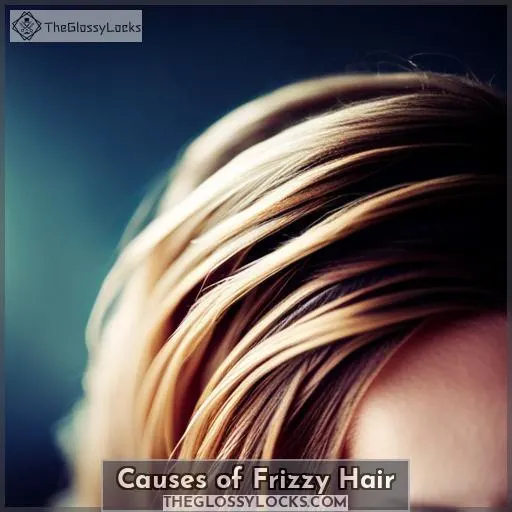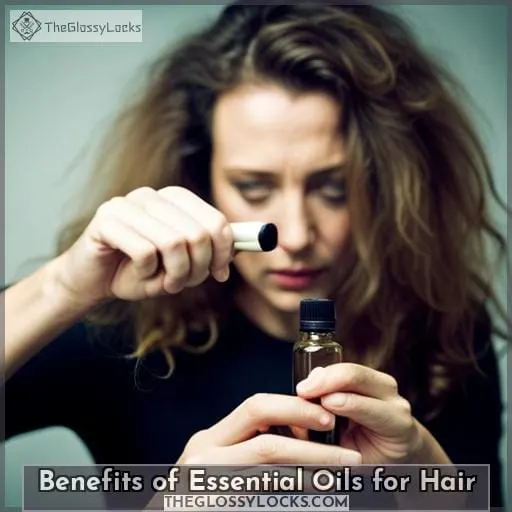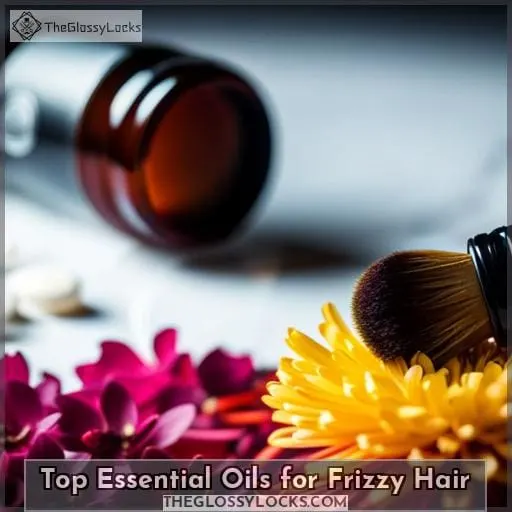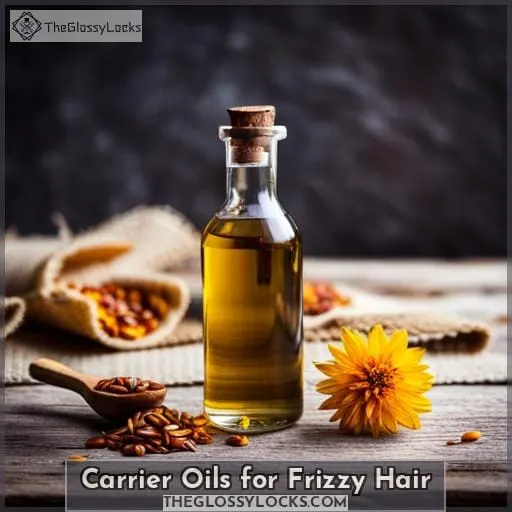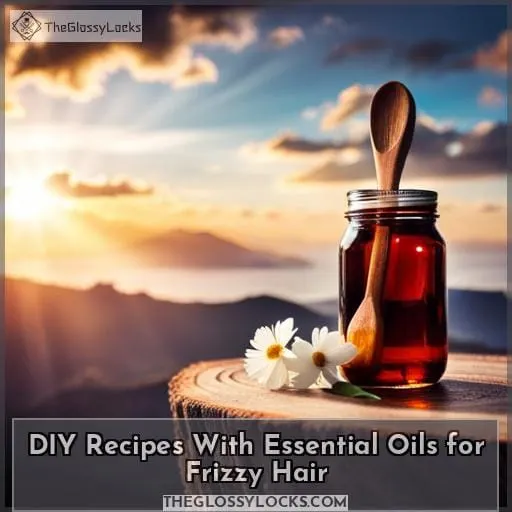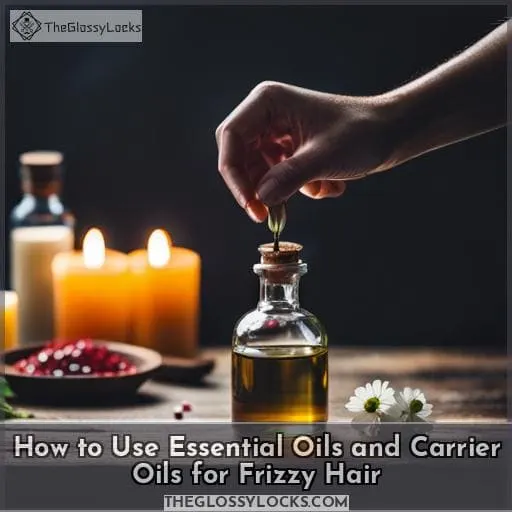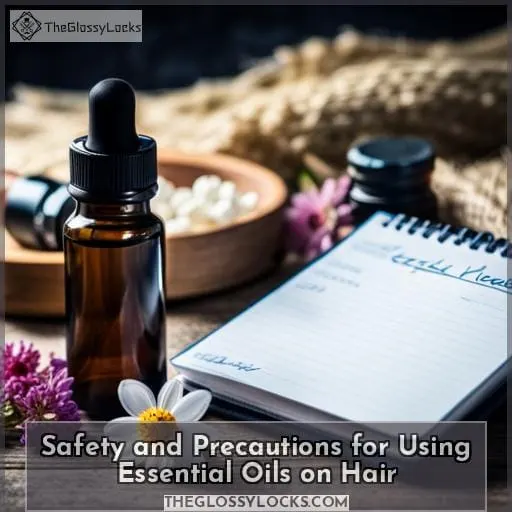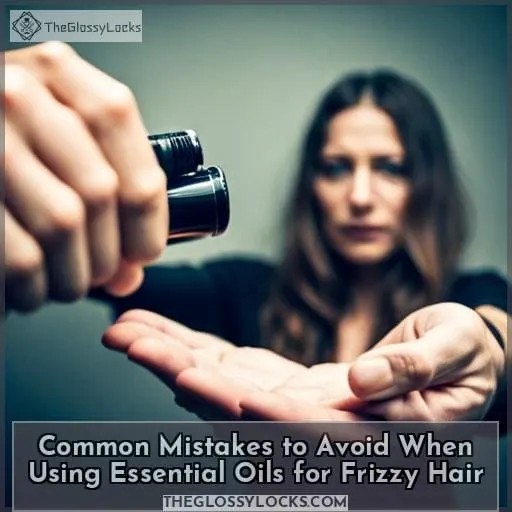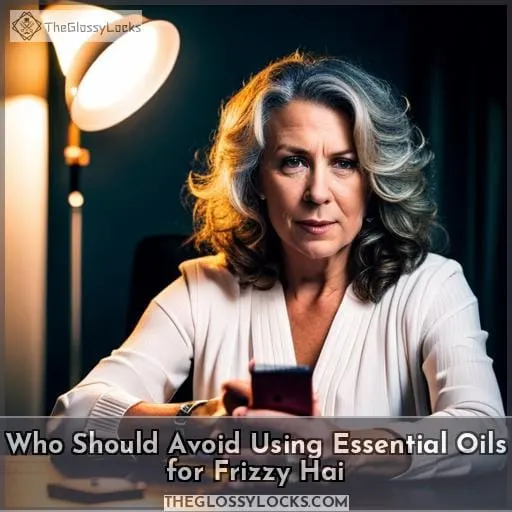This site is supported by our readers. We may earn a commission, at no cost to you, if you purchase through links.
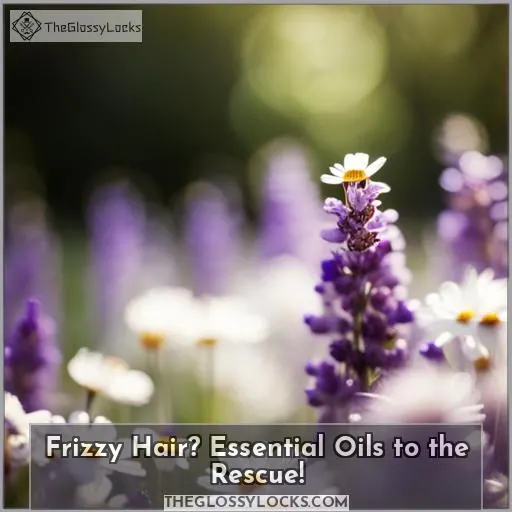 Tired of dealing with frizzy hair that seems impossible to manage? Look no further! Essential oils are here to rescue your locks and give you the smooth, shiny hair you’ve always dreamed of.
Tired of dealing with frizzy hair that seems impossible to manage? Look no further! Essential oils are here to rescue your locks and give you the smooth, shiny hair you’ve always dreamed of.
With their natural nourishing properties, these oils can help tame frizz, moisturize dry strands, and promote overall hair health. Say goodbye to unruly hair days and hello to beautiful tresses with the power of essential oils for frizzy hair.
Table Of Contents
- Key Takeaways
- Understanding Frizz
- Causes of Frizzy Hair
- Benefits of Essential Oils for Hair
- Top Essential Oils for Frizzy Hair
- Carrier Oils for Frizzy Hair
- DIY Recipes With Essential Oils for Frizzy Hair
- How to Use Essential Oils and Carrier Oils for Frizzy Hair
- Safety and Precautions for Using Essential Oils on Hair
- Common Mistakes to Avoid When Using Essential Oils for Frizzy Hair
- Who Should Avoid Using Essential Oils for Frizzy Hai
- Frequently Asked Questions (FAQs)
- Can essential oils completely eliminate frizz in hair?
- Are there any essential oils that can cause further dryness in frizzy hair?
- How often should essential oils be applied to hair to see noticeable results?
- Can essential oils be used on color-treated or chemically processed hair?
- Are there any specific essential oil blends that work best for different hair types (curly, straight, fine, thick)?
- Conclusion
Key Takeaways
- Frizz occurs due to disrupted moisture balance and can be exacerbated by humidity and dryness.
- Proper moisture balance is essential to combat frizz caused by humidity or dryness.
- Essential oils help restore moisture balance and result in smooth, manageable locks.
- Lavender oil, argan oil, coconut oil, and olive oil are top essential oils for frizzy hair.
Understanding Frizz
If you have ever experienced frizzy hair, you know how frustrating it can be. Understanding frizz is essential in order to effectively manage and prevent it.
Frizz occurs when the moisture balance of your hair is disrupted, leading to lifted cuticle layers and a rough texture. Humidity plays a significant role in exacerbating frizz as the excess moisture in the air causes your hair to absorb it, resulting in swelling and unruly strands.
Dryness also contributes to frizziness by causing dry cuticles that are more prone to lifting.
To combat frizz caused by humidity or dryness, maintaining proper moisture balance is key. Using essential oils that nourish and hydrate your scalp and hair can help restore this balance, leaving you with smooth, manageable locks despite external factors like humidity.
Causes of Frizzy Hair
Have you ever wondered what causes frizzy hair? Understanding the underlying factors can help you take better care of your locks. From dryness and external influences to chemical damage, several elements contribute to that unruly frizz.
Let’s delve into these causes so that you can effectively manage and tame your mane.
Frizz Prevention Techniques
To prevent frizz and manage your hair effectively, it’s important to understand the causes of frizzy hair.
Factors such as:
- Humidity control
- Protective styling
- Hydration balance
- Overnight treatments
- Environmental factors
can all contribute to frizziness.
By controlling these factors and implementing strategies like using essential oils for moisture retention or incorporating protective hairstyles during high humidity periods, you can successfully combat frizz and achieve smooth and manageable hair.
Managing Flyaways Effectively
To effectively manage flyaways and prevent frizzy hair, you can incorporate specific techniques into your daily hair care routine.
Flyaway woes can be caused by various factors such as weather effects and texture transformations.
To combat these pesky strands, try using styling hacks like:
- Applying a small amount of leave-in conditioner
- Smoothing down flyaways with a clean toothbrush sprayed with hairspray
Natural remedies like essential oils can also help tame frizz and keep your locks looking sleek and smooth.
Tips for Frizz Taming
Looking to tame frizz and keep your hair sleek and smooth? Don’t worry, there are natural remedies and styling techniques that can help.
Frizzy hair is often caused by factors like:
- Dryness
- External influences
- Chemical damage
- Weather impact (especially humidity)
- Lifestyle choices
To combat frizz effectively, incorporate essential oils into your hair care routine for their moisturizing properties.
- Reducing heat exposure
- Using appropriate products to manage flyaways better
Benefits of Essential Oils for Hair
Looking to enhance your hair health and combat frizz? Essential oils are the answer! These potent plant extracts offer a range of benefits, including:
- Stimulating hair growth
- Moisturizing the scalp and hair
- Nourishing follicles
- Regulating texture
By incorporating essential oils into your hair care routine, you can achieve consistent results with long-lasting effects.
Best essential oils
Now let’s delve into the benefits of essential oils for your hair, so you can effectively combat frizz and achieve healthier locks.
Essential oils offer a wide range of aromatherapy benefits that promote hair health. They can be used in various ways, including as ingredients in hair mask blends or DIY diffuser blends to nourish your scalp and strands.
Additionally, incorporating essential oils into scalp massages can stimulate blood circulation and improve overall scalp health.
However, it’s important to prioritize essential oil safety by properly diluting them before use on the skin or hair.
Frizz prevention techniques
Wondering how essential oils can help prevent frizz and promote healthier hair?
Frizz prevention is all about hydration techniques and understanding the impact of weather on your locks.
Essential oils like lavender, argan, coconut, olive, and castor oil can provide deep moisture to combat dryness that leads to frizz.
By incorporating these oils into your hair care routine, you can nourish your strands from within and maintain smoothness even in challenging weather conditions.
Reader engagement opportunities
Are you curious about the benefits of essential oils for your hair?
Essential oils offer a natural and effective solution to frizzy hair, providing numerous benefits such as:
- Stimulating hair growth
- Moisturizing the scalp and hair
- Nourishing follicles
- Regulating texture
- And more.
Share your daily routine incorporating essential oils or debunk common myths surrounding their usage.
Engage in discussions about how humidity impacts frizz control or share styling techniques that work best for you in different climates.
Top Essential Oils for Frizzy Hair
Looking to tame frizzy hair? Look no further than these top essential oils.
Lavender oil is known for increasing hair thickness and reducing dryness, while argan oil repairs rough hair with its high Vitamin E content.
Coconut oil hydrates and adds luster, olive oil removes frizz and locks in moisture, and castor oil smoothes cuticles for softer, more manageable hair.
Lavender Essential Oil
You should regularly incorporate lavender essential oil into your hair care routine to effectively combat frizz.
Lavender has numerous benefits for your hair, including increasing thickness and reducing dryness.
To experience the full benefits of lavender essential oil, you can apply it directly to your scalp or mix it with a carrier oil like coconut or jojoba oil.
Additionally, incorporating lavender into aromatherapy sessions or using it during a relaxing scalp massage can provide additional relief from frizzy hair.
Argan Oil
To combat frizzy hair, incorporate argan oil into your hair care routine.
Argan oil offers numerous benefits for managing frizz and promoting healthy hair.
It’s rich in essential fatty acids that nourish and moisturize the strands, combating dryness and reducing frizz.
This versatile oil can be applied to different hair types, from fine to curly, providing hydration without weighing down the hair.
Additionally, choosing sustainably sourced argan oil supports ethical practices in the beauty industry while empowering you with beautiful, manageable locks.
Coconut Oil
For optimal frizz control, incorporate coconut oil into your hair care routine. This versatile oil is packed with benefits for your hair, including hydration and frizz prevention.
Here are four ways to use coconut oil for managing frizzy hair:
- Apply a few drops of coconut oil to damp or dry hair as a leave-in treatment.
- Use it as an overnight deep conditioning mask by applying generously before bed and washing out in the morning.
- Mix it with other essential oils like lavender or rosemary for DIY blends that promote healthy hair.
- Don’t forget to share your own tips on using coconut oil in the comments section below!
Olive Oil
One essential oil that can effectively combat frizz is olive oil. Olive oil contains natural emollients and antioxidants that help to moisturize the hair, reduce frizz, and add shine. It also has the ability to penetrate the hair shaft, providing deep nourishment from within.
To use olive oil for frizzy hair, you can apply it directly or create DIY blends with other essential oils such as lavender or peppermint for added benefits.
| Olive Oil Benefits | Frizz-Free Techniques |
|---|---|
| Moisturizes | Reduces flyaways |
| Adds Shine | Smooths rough cuticles |
| Mends Split Ends | Enhances Hair Texture |
Reader Success Stories:
- I started using olive oil on my frizzy hair and noticed a significant reduction in flyaways.
- After incorporating an olive oil blend into my routine, I finally achieved smooth and shiny results.
Common Mistakes:
- Using too much olive oil: A little goes a long way.
- Applying it incorrectly: Make sure to distribute evenly throughout your hair.
- Not washing out properly: Rinse thoroughly to avoid greasy residue.
Try incorporating this versatile ingredient into your anti-frizz regimen for healthier-looking locks!
Castor Oil
Say goodbye to frizz with castor oil – it’s a game-changer for taming your unruly hair!
Castor oil isn’t only a growth elixir but also an effective frizz fighter. Its thick consistency coats the hair strands, sealing in moisture and smoothing out the cuticles. Additionally, castor oil acts as a scalp soother, reducing dryness and itchiness.
Incorporate this powerhouse ingredient into DIY recipes or use it as a nourishing mask for silky smooth locks.
Carrier Oils for Frizzy Hair
To manage frizzy hair, you can use a variety of carrier oils that will help nourish and hydrate your locks. Carrier oils are beneficial for their ability to penetrate the hair shaft and provide deep hydration.
Here are some key benefits of using carrier oils for frizzy hair:
- Jojoba Benefits: Jojoba oil is known for its similarity to the natural sebum produced by our scalps, making it an excellent choice for scalp hydration.
- Oil Combinations: Combining different carrier oils can enhance their individual properties and create powerful elixirs that address multiple concerns.
- Scalp Hydration: Carrier oils like jojoba oil deeply moisturize the scalp, reducing dryness and promoting overall scalp health.
By incorporating these carrier oils into your DIY elixirs or using them individually, you can effectively combat frizz while nourishing your strands from root to tip.
DIY Recipes With Essential Oils for Frizzy Hair
Now let’s dive into creating your own DIY recipes with essential oils for frizzy hair.
Take control of your hair and say goodbye to unruly frizz by experimenting with oil blends that suit your needs. With the power of essential oils, you can combat the challenges posed by frizzy hair and achieve smooth, manageable locks.
Get inspired by reader testimonials and DIY success stories as you embark on this journey towards taming frizz.
- Choose oils known for their moisturizing properties such as lavender or argan oil.
- Mix carrier oils like coconut or olive oil for added nourishment.
- Customize your blend based on personal preferences and desired results.
Embrace the freedom to create a personalized solution that fights against pesky frizz while enjoying all-natural ingredients.
How to Use Essential Oils and Carrier Oils for Frizzy Hair
For using essential oils and carrier oils to manage frizzy hair, you can follow these simple steps:
-
Oil Application:
- Start by diluting a few drops of your chosen essential oil in a carrier oil.
- Apply the mixture to your scalp and massage it in gently.
- Work the remaining oil through the lengths of your hair, focusing on the ends.
-
Blending Techniques:
- Experiment with different combinations of essential oils and carrier oils to find what works best for your hair type.
- Mix equal parts of different oils or try adding a few drops of an essential oil into your favorite carrier oil.
-
Reader Experiences:
Share tips from readers who’ve successfully used essential and carrier oils for frizz-free styles.
-
Overnight Treatments:
For intense hydration, apply diluted essential and carrier oils before bed. Cover with a shower cap or wrap with towel overnight for maximum results.
By following these techniques, you can effectively use essential oils and carrier oils to manage frizzy hair.
Safety and Precautions for Using Essential Oils on Hair
When using essential oils on your hair, it’s important to take safety precautions into consideration.
Essential oils are highly concentrated and potent, so proper usage is crucial to avoid any adverse effects.
Before applying an essential oil to your hair or scalp, perform a sensitivity test by diluting a small amount of the oil in a carrier oil and applying it to a patch of skin.
When using essential oils on your hair, always remember to dilute them properly with carrier oils according to recommended dilution ratios. Avoid direct application of undiluted essential oils as they can be irritating for the skin and may cause allergic reactions.
Here are some key safety tips for using essential oils on your hair:
| Safety Precautions | Application Techniques |
|---|---|
| Perform sensitivity testing before use | Dilute properly with carrier oil |
| Use recommended dilution ratios | Apply gently through massage |
| Watch out for any allergic reactions | Avoid contact with eyes |
Additionally, when using essential oils on children’s hair, extra caution should be taken due their sensitive skin and potential allergies.
By following these safety guidelines and practicing responsible usage techniques, you can enjoy the benefits of essential oils on your hair.
Common Mistakes to Avoid When Using Essential Oils for Frizzy Hair
To avoid common mistakes when using essential oils for frizzy hair, make sure you don’t overapply the oils.
Applying too much oil can weigh down your hair and make it look greasy instead of smooth and frizz-free.
Another common mistake isn’t properly diluting the essential oils before applying them to your hair. Essential oils are highly concentrated and can be irritating if used undiluted. Always mix them with a carrier oil or water before use.
Additionally, be careful not to apply the essential oil blends directly onto your scalp as this can lead to an oily scalp or clogged pores. Instead, focus on applying them from mid-lengths to ends for maximum effectiveness in taming frizz and promoting healthy-looking locks.
Who Should Avoid Using Essential Oils for Frizzy Hai
If you have allergies or sensitivities to certain oils, it’s important to avoid using essential oils for frizzy hair.
While essential oils can provide numerous benefits for managing frizz and improving hair health, it’s crucial to prioritize your safety and well-being. Allergic reactions are possible when using essential oils, especially if you have known sensitivities.
It’s recommended that individuals with sensitivity concerns perform a patch test before applying any oil directly on their scalp or hair.
Additionally, those with specific medical conditions should consult with a healthcare professional before incorporating essential oils into their hair care routine.
Pregnant women should also exercise caution and seek guidance from their doctor due to potential pregnancy precautions associated with certain essential oil usage.
Lastly, when it comes to children’s safety, extra care must be taken as some essential oils may not be suitable for young children due to their delicate skin and developing immune systems.
Frequently Asked Questions (FAQs)
Can essential oils completely eliminate frizz in hair?
Yes, essential oils can significantly reduce frizz in hair by moisturizing and nourishing the strands. While they may not completely eliminate frizz, regular use of essential oils can help manage and control it effectively.
Are there any essential oils that can cause further dryness in frizzy hair?
Yes, some essential oils can worsen dryness in frizzy hair.
Oils like lemon and eucalyptus are known to have a drying effect on the hair.
It’s important to choose hydrating oils like argan or coconut for frizz control instead.
How often should essential oils be applied to hair to see noticeable results?
To see noticeable results, apply essential oils to your hair at least once a week.
Consistency is key in nourishing and moisturizing your frizzy hair, helping you achieve the liberation and freedom from unruly locks that you desire.
Can essential oils be used on color-treated or chemically processed hair?
Yes, essential oils can be used on color-treated or chemically processed hair.
They provide nourishment and hydration to restore health and manage frizz.
Choose oils like argan or jojoba for their restorative properties.
Are there any specific essential oil blends that work best for different hair types (curly, straight, fine, thick)?
Yes, there are specific essential oil blends that work best for different hair types.
For curly hair, try a blend of lavender and rosemary oils.
For straight or fine hair, consider using chamomile and sandalwood oils.
Thick hair can benefit from a fusion of peppermint and cedarwood oils.
Conclusion
Say goodbye to frizzy hair and hello to smooth, shiny locks with the power of essential oils.
These natural wonders can nourish and tame your unruly tresses, moisturize dry strands, and promote overall hair health.
Lavender essential oil, argan oil, coconut oil, olive oil, and castor oil are some of the top choices for tackling frizz.
By incorporating essential oils into your hair care routine and using them with carrier oils, you can say goodbye to frizz and hello to beautiful, manageable hair.


